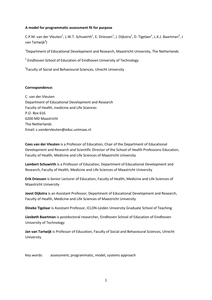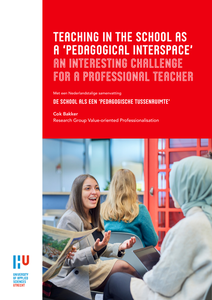The extent to which mentor teachers are able to address mentees' individual needs is an important factor in the success of mentoring. A two-dimensional model of mentor teacher roles in mentoring dialogues, entitled MERID, is explored empirically. Data regarding five aspects of mentoring dialogues were collected, using a sample of 20 transcriptions of mentoring dialogues, in which 112 topics were discussed and 440 mentor teacher utterances emerged. Correlations between the five aspects were determined and a cluster analysis was conducted. There is empirical support for the model. It is a useful framework to promote reflection on mentor teachers' supervisory behaviour.
DOCUMENT

Teacher beliefs have been shown to play a major role in shaping educational practice, especially in the area of grammar teaching―an area of language education that teachers have particularly strong views on. Traditional grammar education is regularly criticized for its focus on rules-of-thumb rather than on insights from modern linguistics, and for its focus on lower order thinking. A growing body of literature on grammar teaching promotes the opposite, arguing for more linguistic conceptual knowledge and reflective or higher order thinking in grammar pedagogy. In the Netherlands, this discussion plays an important role in the national development of a new curriculum. This study explores current Dutch teachers’ beliefs on the use of modern linguistic concepts and reflective judgment in grammar teaching. To this end, we conducted a questionnaire among 110 Dutch language teachers from secondary education and analyzed contemporary school textbooks likely to reflect existing teachers’ beliefs. Results indicate that teachers generally appear to favor stimulating reflective judgement in grammar teaching, although implementing activities aimed at fostering reflective thinking seems to be difficult for two reasons: (1) existing textbooks fail to implement sufficient concepts from modern linguistics, nor do they stimulate reflective thinking; (2) teachers lack sufficient conceptual knowledge from linguistics necessary to adequately address reflective thinking.
DOCUMENT

Secondary school physical education (PE) teachers are continuously challenged to find ways to support students learning and motivate them for an active and healthy lifestyle. To address this complexity, continuing teacher professional development (TPD) is key. Technological tools can facilitate the effective delivery of TPD in this context. Successful implementation of this technology, however, is not self-evident. Based on the general aim of effectively integrating technologies in the educational process and focusing on the needs of educators, this study examines how the evidence-based theoretical TARGET framework for creating a motivating PE learning climate might be embedded into a digital professional development tool for PE teachers, useful in everyday practice. It presents a case study in which a multidisciplinary team of researchers, designers, and end-users iteratively went through several phases of need identification, idea generation, designing, development, and testing. By using a participatory approach, we were able to collect contextualized data and gain insights into users’ preferences, requirements, and ideas for designing and engaging with the tool. Based on these insights the TPD TARGET-tool for PE teachers was ultimately developed. The most prominent characteristics of this tool are (1) the combination of an evaluative function with teaching strategy support, (2) the strong emphasis on ease of use due to the complex PE teaching context, (3) the avoidance of social comparison, and suggestions of normative judgment, and (4) the allowance for a high level of customization and teacher autonomy.
DOCUMENT

The dialogue between a mentor teacher and a prospective teacher is a key element in the supervision of prospective teachers in the workplace. This literature study deals with the issue of how to conceptualize the supervisory behaviour of mentor teachers in mentoring dialogues by systematically examining empirical literature on aspects of mentor teachers' behaviour during dialogues with prospective teachers. From the findings a model is derived which can be used to describe and map mentor teachers' behaviour in mentoring dialogues. The model may be helpful in the further development of the quality of mentor teachers' behaviour in mentoring dialogues.
DOCUMENT

Purpose: The aim of this study is to measure the concurrent validity of the Athletic Skills Track (AST) by examining whether its outcome score correlates with the holistic judgments of experts about the quality of movement. Method: Video recordings of children performing the AST were shown to physical education teachers who independently gave a holistic rating of the movement quality of each child. Results: Both intra- and interrater reliability of the teachers’ ratings were moderate to good. The holistic judgments on movement quality were significantly correlated with AST time, showing that higher ratings were associated with less time required to complete the track. Next, hierarchical stepwise regression indicated that in addition to the holistic rating, also age, but not gender, explained part of the variance in AST time. Conclusion: The findings show that the AST has good concurrent validity and provides a fast, indirect indication for quality of movement.
DOCUMENT
A model for programmatic assessment in action is proposed that optimizes assessment for learning as well as decision making on learner progress. It is based on a set of assessment principles that are interpreted from empirical research. The model specifies cycles of training, assessment and learner support activities that are completed by intermediate and final moments of evaluation on aggregated data-points. Essential is that individual data-points are maximized for their learning and feedback value, whereas high stake decisions are based on the aggregation of many data-points. Expert judgment plays an important role in the program. Fundamental is the notion of sampling and bias reduction for dealing with subjectivity. Bias reduction is sought in procedural assessment strategies that are derived from qualitative research criteria. A number of challenges and opportunities are discussed around the proposed model. One of the virtues would be to move beyond the dominating psychometric discourse around individual instruments towards a systems approach of assessment design based on empirically grounded theory.
MULTIFILE

This article explores how schools can function as a pedagogical in-between space, or a pedagogical inter-space, and how lecturers can act professionally within this space, of which they themselves are also a part. Met een samenvatting in het Nederlands: De school als een ‘pedagogische tussenruimte’.
DOCUMENT

Self-efficacy is een belangrijk begrip uit de sociaal cognitieve theory van Bandura (1997) en duidt op het geloof dat mensen hebben in hun kunnen om een bepaalde taak in een toekomstige situatie succesvol uit te voeren. Self-efficacy van leraren duidt op het geloof van leraren in hun kunnen om het leren van studenten positief te beïnvloeden. Leraren met een hoge mate van self-efficacy hebben een sterkere positieve invloed op de prestaties, de motivatie en schoolattitude van leerlingen, dan leraren met een lage mate van self-efficacy. Daarom is het van belang dat lerarenopleidingen aandacht besteden aan het ontwikkelen van self-efficacy bij hun studenten. Omdat binnen het competentiegerichte opleiden van leraren assessments een belangrijke plaats innemen, wordt in deze dissertatie onderzocht hoe assessment de self-efficacy van studenten beïnvloedt en hoe vervolgens de lerarencompetenties worden beïnvloed. Allereerst is onderzocht van welke factoren binnen het hoger onderwijs is gebleken dat deze de self-efficacy van studenten positief beïnvloeden. Hieruit bleek dat de self-efficacy van studenten wordt verhoogd als zij succeservaringen opdoen en als zij verbaal worden ondersteund door hun omgeving. Van deze bevindingen zijn 2 factoren afgeleid die van kenmerkend zijn voor een competentie assessment en die in deze dissertatie nader worden onderzocht. De eerste factor is de authenticiteit van een assessment, dit duidt op de mate waarin tijdens een assessment zaken worden getoetst die belang zijn voor het beroep van leraar. De tweede factor is de feedback die aan studenten wordt verstrekt tijdens het assessment. Om de invloed van deze factoren op de self-efficacy van studenten te kunnen meten, is er een self-efficacy vragenlijst ontwikkeld, specifiek gericht op 1e jaarstudenten van een lerarenopleiding. Omdat studenten in het 1e jaar werken aan de ontwikkeling van 6 competenties, is het instrument bedoeld om de self-efficacy van studenten met betrekking tot de zes lerarencompetenties (interpersoonlijk, pedagogisch, vakinhoudelijk en didactisch, organisatorisch, samenwerking met collega’s en reflectie en ontwikkeling) te diagnosticeren. Uit studie twee bleek dat de vragenlijst voldoende betrouwbaar en valide is om het diagnostisch instrument te gebruiken tijdens de begeleiding van studenten. Tevens kwam uit deze studie enig bewijs voor de stelling dat studenten aan een lerarenopleiding beginnen met een globale ongedifferentieerde self-efficacy, en dat als zij ervaringen opdoen met lesgeven er een verdere differentiatie van hun self-efficacy plaatsvindt. In de derde studie werd de kernvraag van deze dissertatie onderzocht. Hieruit bleek dat naarmate de studenten, de prestatie die zij bij het assessment moeten leveren als authentieker ervaren, des te sterker dit hun self-efficacy van de 6 competenties beïnvloedt. Verder bleek dat naarmate studenten de kwaliteit van de verstrekte feedback als hoger ervaren, des te sterker dit hun self-efficacy op 4 van deze 6 competenties beïnvloedt. Tenslotte bleek uit deze studie dat de genoemde assessment-factoren de leerresultaten van studenten op de lerarencompetenties indirect beïnvloeden, dit houdt in dat de assessmentfactoren de self-efficacy van studenten beïnvloeden en dat de self-efficacy van studenten vervolgens van invloed is op leerresultaten van studenten op de lerarencompetenties. In de vierde studie zijn enkele resultaten uit de derde studie diepgaand onder de loep genomen. Door een aantal studenten te interviewen is onderzocht hoe de ervaringen die studenten opdoen tijdens een assessment bijdragen aan hun self-efficacy. Hieruit bleek dat de genoemde assessmentfactoren tijdens zowel de voorbereidingsfase, de interviewfase als de feedbackfase van het portfolio competentie assessment, de self-efficacy van studenten positief beïnvloeden. Voortkomend uit de onderzoeksresultaten, worden op het einde van de dissertatie enkele adviezen voor lerarenopleidingen beschreven.
DOCUMENT

For many years, teachers’ intuitive evaluations of pupils’ competences was considered to be a solid base for decisions; it is only recently that teachers have been expected more and more to use data. We state that insights on intuitive and data-driven approaches need to be integrated to understand and support informed, professional decisions in education. Starting from an integrated framework we studied teachers’ decision process regarding the transition of 30 pupils during their last year of primary education within a case study design. Results describe different approaches to decision-making. Some teachers greatly rely on intuitive processes when they ultimately make the decision, even if data was collected. Other teachers combine and weigh information deriving from deliberate processes of data use and from intuitive recognition before they decide. Implications for theory and practice are explained.
LINK
This article aims to explore the moral ideas and experiences that students at Dutch universities of applied sciences (UAS) have of being a professional with an ‘ethical compass.’Semi-structured interviews were held with 36 fourth-year Bachelor students divided over four institutions and three different programmes: Initial Teacher Educa- tion, Business Services and Information and Communication Technology. Findings show that students say they strive to be(come) moral professionals, but that they have difficulties recognising and articulating the moral aspects of their professional roles. They seem to lack a moral vocabulary and the moral knowledge to verbalise their aspirations and to provide arguments to explicate or legitimise their moral behaviour. While most students were critical of the support they received from their universities, they indicated that various other role models and (work) experiences did have a strong and positive influence on their moral development. In this article, we reflect on the findings in relation to international empirical research on students’ moral development and highlight the characteristics of UAS students.
DOCUMENT
